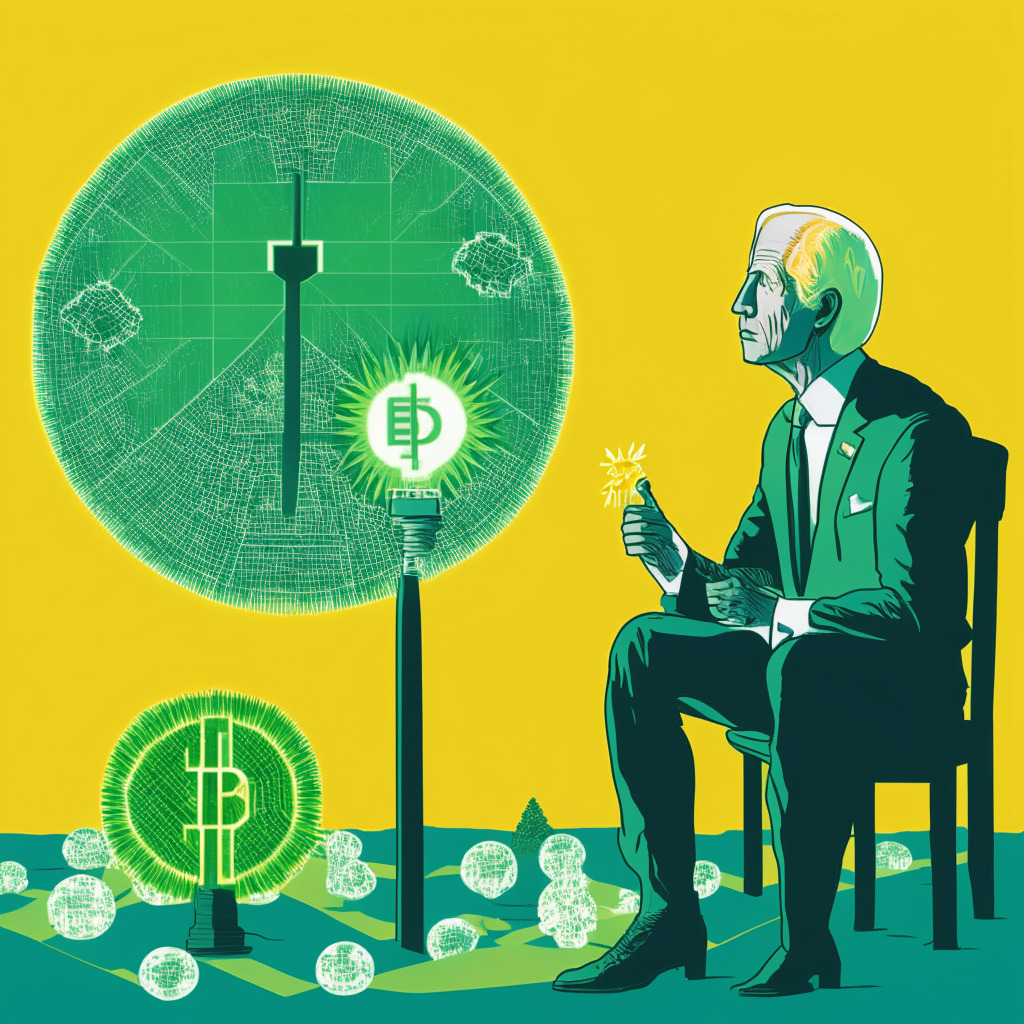Robert F. Kennedy Jr., recently purchased two Bitcoins for each of his seven children, a move triggered by criticisms for advocating Bitcoin without personal stake. He views Bitcoin as a means of defending public rights against government and corporate invasion. However, this action raises questions regarding potential conflict of interest. Despite potential implications, Kennedy continues to publicly endorse Bitcoin.
Search Results for: Robert F. Kennedy Jr.
Unmasking Robert F. Kennedy Jr.: Journey from Bitcoin Skeptic to Advocate and The Implications
Robert F. Kennedy Jr. recently revealed his membership of the Bitcoin brigade, despite earlier contestations. This change occurred post-attendance at the Miami-based Bitcoin Conference. Kennedy’s decision to purchase and publicly support Bitcoin however, raises questions about potential conflict of interest, especially with regards to future legislation under Kennedy’s potential presidency.
Kennedy’s Bold Crypto Agenda: An Independent Run for Presidency Powered by Bitcoin
“Robert F. Kennedy Jr., a Bitcoin supporter, announced his independent candidacy for presidency. Among his platforms is a positive stance on cryptocurrencies, including campaign finance via Bitcoin, tax exemptions for Bitcoin investors, and potential backing of the U.S. dollar with Bitcoin.”
RFK Jr. Defends Bitcoin Amid Environmental Criticisms: Unveiling A Path To Financial Liberty
Robert F. Kennedy Jr. countered common environmental criticisms of Bitcoin, arguing that such narratives should not limit financial liberty. He concurred with Sangha Systems’ Daniel Feldman who proposed Bitcoin mining could bolster renewable energy production, further improving the electric grid. This divergent perspective also underscores the neglected economic advantages of Bitcoin mining.
Unveiling Politics of Crypto: RFK Jr. Advocates Bitcoin Despite Environmental Controversy
U.S. presidential candidate Robert F. Kennedy Jr. proposes a less alarmist view on Bitcoin’s environmental impact, saying it shouldn’t limit financial freedom. Should he win, he plans to exempt Bitcoin from capital gains tax and shows interest in backing the U.S. dollar with Bitcoin.
US Elections: Kennedy’s Pro-Crypto Stance Stokes Capital Gains Tax Debate
“US Democratic presidential hopeful Robert F. Kennedy Jr. has recently committed to exempt digital currencies from capital gains tax when converted to USD. He claims this will incentivize investment, boost crypto businesses domestically and enhance citizen privacy. Critics warn that this could also open up a Pandora’s Box of risks, including financial instability and abuse of these platforms for illicit activities.”
Unpacking Kennedy’s Bold Bitcoin Backing Proposal: Economic Boon or Bane?
Robert F. Kennedy Jr., a presidential candidate, controversially proposes to back the US dollar with Bitcoin to strengthen the economy and curb inflation. Skeptics voice concerns over Bitcoin’s volatility and potential issues of economic inequality resulting from proposed tax exemptions on Bitcoin-to-dollar conversions.
Elon Musk and RFK Jr. Dodge Crypto Talk, Focus on AI and US Dollar Concerns
Elon Musk and Robert F. Kennedy Jr discussed AI, social media censorship, and COVID misinformation but avoided Bitcoin and digital assets in their conversation. While the digital currency market remains crucial, AI and information handling demand equal attention in our technology-driven world.
Dorsey Backs Pro-Crypto Kennedy for 2024 Presidency: Blockchain Future vs Vaccine Skepticism
Twitter co-founder Jack Dorsey endorses pro-crypto presidential candidate Robert F. Kennedy, Jr. for the 2024 elections. Kennedy aims to protect individual rights to hold and use Bitcoin, resist government intrusion, and end the corrupt merger of state and corporate power.
Crypto in Politics: Jack Dorsey Backs Pro-Bitcoin Presidential Candidate RFK Jr.
Twitter CEO Jack Dorsey supports pro-crypto Democrat candidate Robert F. Kennedy Jr., who accepts Bitcoin donations for his presidential campaign. Kennedy criticizes CBDCs as tools to suffocate dissent and condemns a proposed 30% tax on crypto mining.
Elon Musk Invites Pro-Bitcoin Candidate RFK Jr. to Twitter Spaces: A Crypto-Politics Collision
Elon Musk invites 2024 presidential candidate and Bitcoin supporter Robert F. Kennedy Jr. for a Twitter Spaces interview, raising intrigue on crypto and politics discussions. Kennedy’s opposition to CBDCs and concerns over government control align with Musk’s crypto affinities.
RFK Jr.’s Bitcoin Campaign Donations: Innovation or Recklessness?
Democratic presidential candidate Robert F. Kennedy Jr. announces plans to accept Bitcoin campaign donations, addressing issues like Bitcoin’s classification as a security and considering pardoning individuals like Ross Ulbricht. His pro-cryptocurrency stance highlights trust in blockchain’s future but raises concerns about transparency and regulation.
RFK Jr.’s Bitcoin Campaign Donations: Breaking Barriers or Courting Controversy?
Democratic presidential candidate Robert F. Kennedy Jr. announces he will be the first to accept Bitcoin campaign donations, emphasizing its link to democracy and freedom. Critics argue potential drawbacks include lack of regulation, anonymity, and market instability affecting donation value.
Stagnation Strikes: Fed Rate Hikes, Alleged Token Manipulation, and Kennedy’s Crypto Conspiracy
This week in crypto: Stagnation due to the Fed’s interest rate hike, Binance’s “CZ” Zhao flags Tron CEO’s suspicious token transfer, crypto-based conspiracies from 2024 Presidential hopeful, reports of Amazon’s possible NFT marketplace launch, and El Salvador incentivizes tech innovation.
RFK Jr. Challenges Biden’s Crypto Stance: Privacy, Taxation, and CBDC Concerns Unveiled
Robert F. Kennedy Jr. criticizes President Biden’s 30% tax on crypto mining and expresses concerns over government control on bank accounts and payment platforms. He opposes central bank digital currencies, arguing they could be used to subdue dissent by cutting off access to funds.
Economic Mega-Crisis: Kennedy Challenges Biden, Debates Cryptocurrency & Banking Collapse
Robert F. Kennedy Jr. warns of an impending economic “mega-crisis,” calling for urgent attention to rebuild the economy as job openings plummet and inflation hits the middle and working class. Kennedy criticizes President Biden’s proposed Digital Asset Mining Energy (DAME) excise tax, asserting the importance of cryptocurrencies in driving innovation and maintaining financial freedom.
2024 Presidential Race: RFK Jr.’s Impact on Crypto Policy and CBDC Debate
2024 presidential race candidate Robert F. Kennedy Jr. criticizes the Biden Administration’s proposal for a 30% tax on cryptocurrency mining, arguing it hinders industry growth and stifles innovation. Kennedy also accuses U.S. financial regulators of waging “an extra-legal war on crypto” and opposes Central Bank Digital Currencies as mechanisms for social surveillance and control.
RFK Jr’s Pro-Crypto Presidential Run: Redefining America’s Financial Future and Political Landscape
Robert F. Kennedy Jr., running as an independent candidate in the upcoming U.S. Presidential Race, is adopting a pro-cryptocurrency stance. Aiming to make America a global hub for cryptocurrency, particularly Bitcoin, Kennedy proposes backing the USD with hard currencies, including Bitcoin. This move could fundamentally transform America’s position in the global crypto landscape and the fate of Bitcoin.
Crypto in Politics: RFK Jr’s Support for Bitcoin & Deep Dive into Current Market Trends
U.S. presidential candidate Robert F. Kennedy Jr. has voiced support for Bitcoin, promising to remove capital gains taxes on cryptocurrencies if elected. His stance adds an interesting perspective, while the fluctuating crypto market continues to affect prices. Notably, Toncoin, Sonik Coin, Binance Coin, Launchpad XYZ, and Tron exhibit promising dynamics amid market volatility.
Cryptocurrency Crossroads: Santos Scandal Meets RFK Jr’s Bitcoin Vision
“The Santos incident reveals a complex intertwining of political intrigue, crypto manipulation, and scams, while figures like Robert F. Kennedy Jr. demonstrate a supportive stance towards cryptocurrency. This highlights the intersection of politics, regulation, and digital finance in unanticipated ways.”
Presidential Candidate Bet on Bitcoin: Sincere Support or Political Strategy?
Democratic presidential candidate, Robert F. Kennedy Jr., has reportedly invested up to $250,000 in Bitcoin. This comes after his campaign announced its intention to accept Bitcoin donations. Despite having previously stated he was not an investor in cryptocurrency, Kennedy Jr. now seems to actively court the crypto community, emphasizing the importance of supporting the industry amidst increasing SEC scrutiny. No exact details were disclosed regarding his Bitcoin investment.
Cryptocurrency Enters US Presidential Race: Will It Define Campaign Platforms?
The upcoming US presidential elections feature candidates recognizing cryptocurrency potential in their platforms. Miami’s pro-bitcoin mayor Francis Suarez and Democratic candidate Robert F. Kennedy Jr. discuss embracing digital assets, while Republican candidate Sen. Tim Scott aims to develop a framework for them. This shift highlights digital currencies’ growing prominence in political strategy and future campaigns.
2024 Presidential Election: Crypto Regulation Takes Center Stage in Debates
The 2024 US presidential election could witness discussions on crypto market regulation taking center stage, impacting the US’s position as a global crypto hub. Prospective candidates like Ron DeSantis and Robert F. Kennedy Jr. openly support digital asset trading freedom, while JP Morgan CEO Jamie Dimon’s potential candidacy raises questions about cryptocurrency’s role in the American financial landscape.
2024 Presidential Race: Crypto Policies Take Center Stage and Impact on Voters’ Choice
The 2024 U.S. presidential race sees candidates like Ron DeSantis, Robert F. Kennedy Jr., and Vivek Ramaswamy supporting cryptocurrencies, expressing their belief in financial freedom and innovation. However, the balance between promoting crypto and ensuring safety remains crucial, making the 2024 elections a litmus test for crypto in the U.S. political landscape.
RFK Jr’s Bitcoin Stance: Protecting Privacy or Inviting Misuse and Energy Debates?
Presidential hopeful Robert F. Kennedy Jr. embraces Bitcoin, advocating for protection from invasive surveillance and governmental control at the 2023 Bitcoin Conference. He criticizes proposed energy tax on Bitcoin miners and supports decentralized systems for cryptocurrencies and democracy.
Freedom to Transact as Vital as Expression: Politicians Weigh In on Bitcoin’s Role and Risks
Democratic presidential candidate Robert F. Kennedy Jr. speaks at the Bitcoin 2023 conference, equating the freedom to transact with freedom of expression. Emphasizing Bitcoin’s importance, Kennedy highlights its role as a bulwark against governmental and corporate intrusion, while advocating for citizens’ rights to hold and use Bitcoin and opposing invasive cryptocurrency regulations.
Cryptocurrency
US Presidential Candidate Robert F. Kennedy Jr. supports the adoption of Bitcoin and cryptocurrencies amidst its growing popularity and market capitalization. This brings mainstream acceptance, regulation, and discussions on cryptocurrency benefits and risks into public consciousness. It’s crucial for the blockchain community to raise public awareness and understanding, ensuring informed decisions are made.
Cryptocurrency Mining Tax: Innovation or Environmental Disaster? Pros and Cons Uncovered
Robert F. Kennedy Jr. addresses the consequences of a proposed 30% tax on cryptocurrency mining and its sustainability concerns. He emphasizes the need for a diversified financial landscape, trust in government institutions, privacy, and embracing multiple currencies while questioning critiques of energy consumption and their potential motives. The debate on energy usage in cryptocurrency mining highlights sustainability, innovation, and necessity for ecosystem supporting multiple currencies.
Binance’s Stablecoin Delisting: A Regulatory Avalanche or Necessary Compliance Step?
“Binance plans to delist all stablecoins from its European platform by June 2024, complying with Europe’s tight regulation. The move, following the passing of Europe’s crypto regulation law, MiCA, could significantly impact the European crypto market. Meanwhile, the U.S. grapples with its digital currency dilemma, revealing distinct attitudes towards financial digitization.”
US Central Bank Digital Currency: Speed of Transaction vs Privacy Concerns
“The United States House Financial Services Committee is considering further restrictions on a central bank digital currency (CBDC). Critics argue that a CBDC would centralize control, contradicting the philosophy behind cryptocurrency, and posing potential privacy risks. Despite some progress, the future of a U.S. CBDC remains uncertain.”
CBDC Anti-Surveillance State Act: Preserving Financial Privacy in the Age of Digital Currencies
U.S. Representative Tom Emmer, with the support of 49 other Republican representatives, reintroduced the CBDC Anti-Surveillance State Act to prevent unjust financial surveillance through retail central bank digital currencies (CBDCs). Advocates contend such government-sanctioned currency must respect financial privacy, individual freedom, and market competitiveness.
Navigating Crypto Regulations: The CBDC Anti-Surveillance State Act and the Privacy Debate
“Regulation of cryptocurrencies and the blockchain technology is a pressing topic, with concerns about privacy and government surveillance. The ‘CBDC Anti-Surveillance State Act’, reintroduced by Rep. Tom Emmer, aims to limit unelected authorities in issuing a central bank digital currency (CBDC), fearing it could be used as surveillance resources.”































